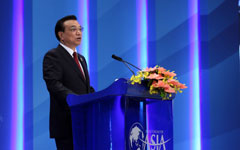First, the stimulus committed 115.8 billion yuan, an increase of 14.3 percent from last year, to the construction of low-rental units and to improving housing conditions for residents of extremely shabby quarters. The money is expected to result in more than 4.7 million new residential units.
Second, very small enterprises don't pay much tax in the first place, although they can face untold extra-legal levies from various local government agencies.
|
 |
|
|
In addition, a railway development fund is to be set up, that will be worth 200 to 300 billion yuan, half of which will be raised through public issuance of bonds.
If the government's total spending on the above items amounts to 500 billion yuan, it is small fry compared with the massive stimulus in 2008, which featured the central government's 4 trillion yuan allocation and much more from local governments.
More importantly, the mini-stimulus practically promises no money, and no leniency on raising money, to all the local governments that are watching local real estate markets hopelessly decline in transactions and in price.
Beijing is not helping them transform their cities into "world-class financial hubs" filled with large government blocks, crowded business districts and high-end shopping malls.
One can be sure that more than a few provincial and municipal officials were disappointed by Premier Li Keqiang's lack of sympathy for their high-flying economic ambitions.
But no one is sure when they will learn to encourage local economic development in more innovative ways.
The author is editor-at-large of China Daily.
